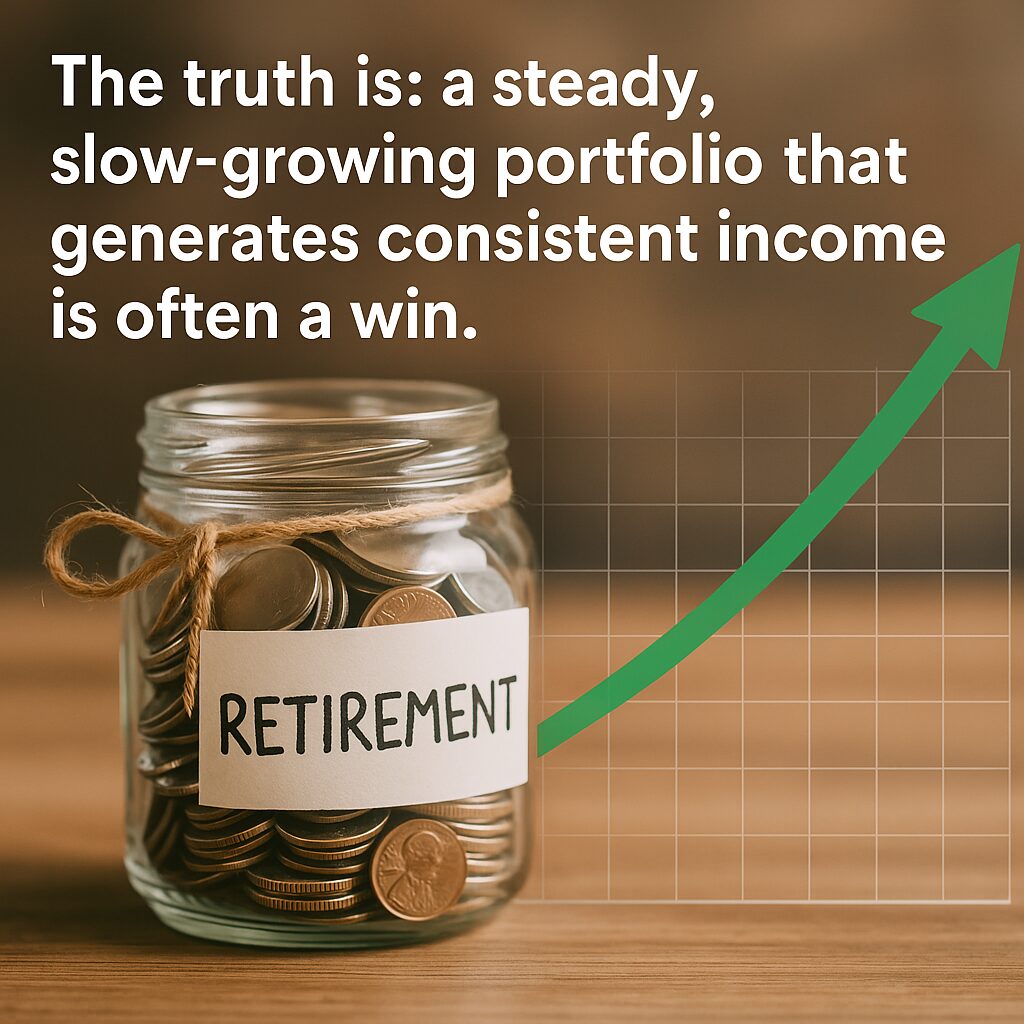
Why Steady, Reliable Income May Be the Most Successful Outcome of All
Welcome to “Money Myths Retirees Still Believe”—a blog series that uncovers the hidden beliefs that can quietly sabotage your financial peace of mind.
Many retirees cling to common money myths that seem true but can lead to poor decisions, lost income, or unnecessary worry. Each post in this series explores one myth—like “cash is trash” or “I need to beat the market”—and replaces it with a smarter, simpler mindset.
If you’re retired or nearing retirement, this series will help you reassess your approach and feel more confident about your financial future.
The Myth: “If It’s Not Growing, It’s Failing”
When Harold retired at 67, he found himself constantly checking the balance of his investment accounts. Even though he had no plans to withdraw money anytime soon, he felt anxious if the numbers didn’t go up every quarter.
“I worked hard for this,” he said. “I need it to keep growing.”
He’d been conditioned to believe that growth is everything—that a flat portfolio meant something was wrong.
But in retirement, growth isn’t the only goal—and it’s often not the most important one.
👉 The truth is: a flat but steady portfolio that generates consistent income is often a win.
Why This Myth Feels So Familiar
During your working years, the focus is on saving, investing, and watching your money grow. That’s what gives you the ability to retire in the first place.
But retirement is a different phase.
Now, the priority shifts from accumulating wealth to using it wisely—without running out.
And that means focusing more on stability and income than high returns.
Growth Can Be Misleading
A portfolio that grows 12% in a year but then drops 15% the next year may not help you sleep well at night—especially if you’re relying on it to pay your bills.
Meanwhile, a portfolio that delivers a reliable 4%–6% annual income with minimal volatility might not grow fast—but it can help you:
- Pay your living expenses
- Preserve your principal
- Avoid panic selling
- Sleep more soundly
In retirement, that kind of quiet success is often far better than chasing big gains.
The Smarter Mindset: Income, Consistency, and Simplicity
Here’s what a winning retirement strategy might actually look like:
✅ A mix of dividend-paying ETFs and bonds
These generate regular income—without requiring you to sell shares.
✅ A cash reserve for short-term needs
Protects you from withdrawing during down markets.
✅ Annuities or pensions (if available)
These provide predictable monthly income for life.
✅ Some long-term growth investments
A modest portion of your portfolio can still be invested for the future—just not the whole thing.
With this setup, your net worth doesn’t need to hit new highs every year.
You just need it to last.
A Real-Life Example
Marsha, a 70-year-old retiree, once felt guilty because her portfolio hadn’t grown in two years. But then she realized: she hadn’t needed it to grow.
Her investments had produced enough income to cover her needs, without touching the principal. She had weathered a market dip without panic. And her cash cushion gave her breathing room.
“I’m not trying to get richer,” she said. “I’m trying to stay comfortable. And I am.”
That’s success.
The Takeaway
You don’t need a portfolio that constantly grows.
You need one that reliably works—for you.
In retirement, success isn’t measured in headlines or high returns.
It’s measured in:
- Bills paid
- No sleepless nights
- Freedom to enjoy your time
- Confidence that your money will last
If your portfolio isn’t “booming”—but it’s paying your way—you’re doing just fine.
Wrapping Up the Series: Money Myths Retirees Still Believe
Over the past 20 posts, we’ve uncovered the common money myths that quietly shape the way retirees think, act, and worry about their finances—from “I need to beat the market” to “I’m not smart enough for this.”
Here’s the good news: you don’t need perfection to have peace of mind.
You just need clear goals, a simple strategy, and the confidence to focus on what truly matters: living well in retirement.
We hope this series has helped you rethink old assumptions, feel more in control, and take a gentler, wiser approach to your financial future.
If one of these posts made you feel more confident—or less alone—you’re already winning.
Thank you for reading.
Here’s to retiring smart, steady, and stress-free.